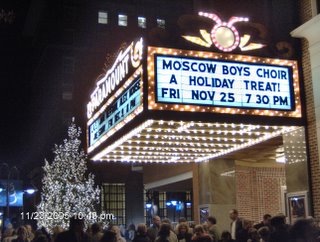Kalinka

Although the show had been marked as "sold out," I took a chance on getting someone's canceled reservation at the Paramount Theatre in Charlottesville last night, and lucked out.
I walked into the box office and asked if there were any cancellations, only to be told no. There was, however, an elegantly dressed woman standing nearby who asked me if I needed just one ticket. When I answered in the affirmative, she said she had one ticket available and sold it to me at the advertised price of $30.
Thus it was that I was able to see the Moscow Boys Choir perform from the best seat in the house, Orchestra Row K, Seat 111 -- dead center.
The program was mostly familiar Christmas songs in English with some French, German, and Spanish thrown in. The Ukrainian song that is best-known in the West, "Carol of the Bells," was also performed, as one might expect.
Oddly, the boys (and six adults who sing bass and tenor) sing English with discernible Russian accents, while their French, German, and Latin are unaccented. I find it puzzling that a world-renowned choral group seems not to have an English diction coach on staff to remedy that problem.
That said, the Russian-accented English was a quaint dimple on the smiling performance of the choir, which was polished even if the overall discipline of the group was a bit lacking.
My point of comparison is with the Vienna Boys Choir, whom I have seen three or four times in concert, a choral group which appears strictly regimented in comparison to these boys from Moscow.
The Russian boys seemed more fidgety on stage than their Austrian counterparts, sometimes shifting from foot to foot, or touching themselves, scratching their noses, adjusting their hair. One blond boy with a bad haircut on the far right was clearly daydreaming or distracted; it looked like he was going through the motions while his mind was miles away. Another boy, who bore a passing resemblance to a young Frankie Muniz, looked like a deer caught in headlights during his first solo, although he appeared more relaxed later in the performance.
What's more, some of the boys were wearing ill-fitting suits (they were all dressed in matching tuxedo jackets and trousers, with white bow ties), and a good number of them wore shoes that were obviously too big for their feet.
I think this last observation has more to say about the state of the Russian economy than it does about Russian art and music, because there was nothing ill-fitting about the actual vocal performances.
The boys did their best work when singing Russian folk songs and classical music, especially an opening triplet of songs by Stepanov, Degtiarev, and Rachmaninoff. A second-act medley of Russian folk songs was punctuated with two outstanding solo turns, one (on "Evening Bells") by the choir's conductor, tenor Leonid Baklushin, the other (on "Ochi Tchiornya
," "Black Eyes" or "Dark Eyes" ) by Il'ya Kanygin, a young operatic baritone who has real star quality.

Through the course of the evening, at least a dozen of the 30 boy sopranos, trebles, and altos were given their own chance to step forward and sing a solo, even if it was just one line in "The Twelve Days of Christmas." (Believe me, the Moscow Boys Choir's surprisingly animated rendition of this song can give the Virginia Glee Club a run for its money. Anyone who has seen the Glee Club sing "The Twelve Days of Christmas" knows precisely what I mean.)
The program had some unexpected portions, including the "Gloria Tibi" and "Kyrie" from Bernstein's Mass. The jazz-infused tarantella of this work was out of place here, though it must have been a challenge for the Moscow Boys Choir. As good as their performance was, it just served as a reminder of what a second-rate composition Bernstein's Mass is, and that these selections, in particular, would serve us better in a trunk kept in the Bernstein family attic, as rejected tunes from the score of Candide
.
Conducter Baklushin brought the audience to its feet to sing along with "America the Beautiful," in infectious Russian-accented English, and again with a rousing finale, the familiar Russian folk song, "Kalinka."
All in all, seeing (and hearing) the Moscow Boys Choir was great fun. I hope to catch them on another American tour someday. Unfortunately, the group has only two CDs available for sale on Amazon.com, and both of them
are Christmas collections
. I would really like to own a recording of the Moscow Boys Choir singing Russian songs, which is simply what they do best. (A new recording, said to include some of those songs, is available on the choir's North American management's web site.)



No comments:
Post a Comment